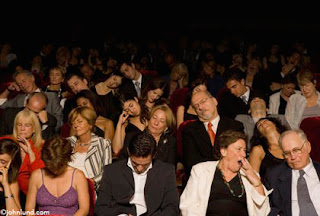- 3 successful interviews (Loyola University, SUNY-Albany, Arizona State University)
- 4 unsuccessful interviews in good faith.
- 2 unsuccessful interviews in bad faith. A "bad faith" interview, as defined here, is one where there is no possibility that the candidate will get an offer. One or more candidates are brought in so that the department can claim to have examined several candidates, when in fact they are set on a particular person from the start (and you are NOT that person). {{Warning for new PhDs: you are the main fodder for this kind of episode, so don't take it too hard if it happens to you.}}
As for my experiences, the juiciest episodes are better explored over a beer sometime. I will sanitize things and only tell a few tales here, using anonymity to protect the guilty. I am still peeved about the bad faith interviews (not that I would like to work at either institution!). In one case, a small but high-quality program, no one seemed at all interested in my work. They had someone there on a temporary line, and clearly wanted to hire this person full time. It is not uncommon to have one applicant already in a department, and rumor ALWAYS says that this person must have the inside track. But in several searches I know well, this was not the case. The searches were rigorous and unbiased, really looking for the best person, whether or not there was someone already in the department with a temporary position.
My other bad-faith interview was in a large prestigious department in a major university. A bunch of the people I talked to spent most of their time saying how great Dr. X is. (Do you know his work? Isn't it good? Have you heard what he said about this or that? Oh, and where do you work?) Before I finished, I asked someone outright if they planned to make an offer to Dr. X, and got a positive reply. I felt good when Dr. X. turned them down.
Several years later this same department asked me again to interview! I made darn sure they indeed had a real interest in me before I went. Yes, I was a serious candidate. I thought the interview went well; I talked to lots of people (more than on my first trip), who seemed very interested in what I had to say. I was told they wanted to make an offer, and had to do a tenure review (I was tenured elsewhere at the time) in order to make an offer with tenure. I sent them all my publications, etc. And that was the end of it. I never heard back from the department, to this day (some 20 years later!). Maybe my email tomorrow will contain a belated job offer (or a rejection!). After quite a while with no news, I ran into someone from the department at a meeting, who said they were sorry the job didn't work out. When I evidently looked puzzled, they said, "Didn't the chair contact you?" Nope. Still waiting for that one...... (Note that I am counting this one as a "good-faith" interview, perhaps too generously).
It turns out I did not pass their tenure review, because I had not yet published a book. It was a "book department": no book, no tenure. Now, every time a book comes out, I am tempted to send a copy to that department. I have published more books now than any archaeologist in that department. But I guess I just wasn't good enough for them. Actually, this episode may have been a blessing in disguise. I had an offer from Albany at the same time, but I might have been tempted by the prestige of the other university. Albany was a much better fit for me (and a much more congenial department overall), and I flourished in ways I would not have at the other place.
One more interview story. It's too long to go into detail here, but I will mention one notable aspect. This was one of my unsuccessful, good-faith interviews. A question from a graduate student after my talk effectively destroyed the entire conceptual foundation of my talk. Absolutely buried me! Deader than a doornail. The interviewee's worst nightmare. As soon as the question was posed, I realized I was sunk. Yet I had this flash that the answer to the contradiction was just at my fingertips, but I couldn't bring it in. I did not get an offer (surprise, surprise). Later I figured out how to resolve the conceptual contradiction that burned me, and got some mileage out of it in a couple of articles. In the acknowledgements of one, I thanked an anonymous graduate student for asking the right question at the wrong time. But after that experience, I was bullet-proof at interviews. There was nothing anyone could do to me as harmful as that experience, and I was much more relaxed at interviews.
I have no idea how typical my experiences have been. Did I have an especially high number of bad-faith interviews? I don't know. I did enjoy most of the interviews, and I met people and learned things at all of them. And now, I hope, I am through with job interviews!
I was thinking that three out of nine was not too bad a record for interviews, but then I talked to my daughter Heather, who is in the business world. Every single job interview she has participated in has led to an offer! Oh well.



